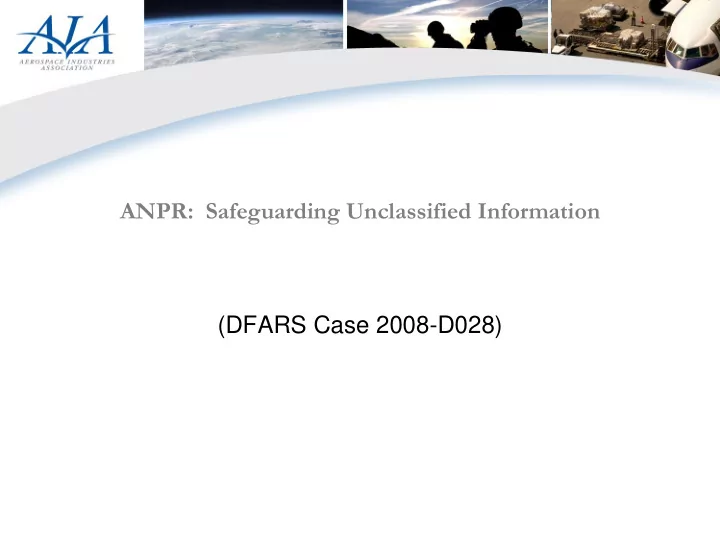

ANPR: Safeguarding Unclassified Information (DFARS Case 2008-D028)
Principal Concerns Scope – too broad in some places and too specific in others Definitions - ambiguous Reporting – concerns about provision, use and protection of data Implementation – Compliance, subcontractor concerns Note: Best Practices responses to all questions will be submitted in writing no later than May 3, 2010.
Scope Safeguarding/marking requirement to address ―all DoD information‖ is too broad to execute successfully – need to be put in contract specifics. Technical standards too specific – ―anti - virus‖; ―anti - spyware‖; ―patches‖; ―service - packs‖; ―hot fixes‖ ANPR requirements are not risk based — need a risk based assessment to reduce personnel and resources costs. ANPR requires ―best level of security available‖— will be costly to implement and will impact smaller companies. – Need to address small subcontractors without IT capability to protect information at the ANPR required level. Cyber security is a national priority and is a concern to all federal agencies, not only DoD.
Definitions As a general rule, terms, clauses, terminology must be clearer to ensure effective implementation. Examples: – ―Adequate security‖ needs citation for standardized implementation – ―Encrypted wireless security‖ is addressed but not wired connections. – Terms such as ―regularly updated‖ ―appropriate‖, ―adequate‖, ―prompt‖.
Reporting How are the existing Company’s Voluntary Framework Agreements impacted by this ANPR? – Need to transition requirements with the mandatory contract requirements in the ANPR. How will mandatory reported intrusions be addressed in Past Performance evaluations? Reported intrusions have the potential to disrupt business continuity – Seizure of computers or servers for forensic analysis could require costly redundant systems for continued business operations. – Unrealistic reporting response requirement (72) has the potential to be administratively burdensome What assurance does industry have that the data the government collects is secure? How will the government assure protection of companies’ proprietary information and report contents? Final FAR Rule should provide protection of companies’ information involved in cybersecurity incidents (e.g., privileged information, information protected by agreements with third parties, etc.)
Implementation Issues What is the Government’s standard for industry compliance with this ANPR, e.g. NIST 800-53 or ISO 27000 series? – Who determines company compliance? – Will there be a recognized certification that will reduce the proliferation of subcontractor audits by primes/government? Meeting compliance requirements does not guarantee complete protection of DoD’s information from compromise. – How will the Government treat "compliant organizations" that suffer a breach? Subcontractor Concerns- Is there a risk based approach to assure proper flowdown? – Are contracts/orders for ―nuts and bolts‖ treated equally as contracts/ subcontracts for major systems? – Are primes liable for subcontractor compromises of DoD’s information – Primes cannot accept responsibility for subcontractor's overall control environment.
Recommend
More recommend